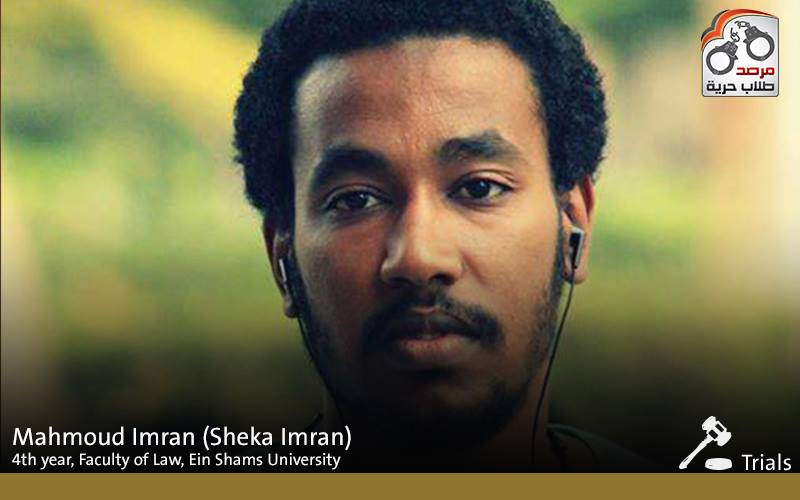Cairo Criminal Court headed by Judge Naji Shehata ruled to postpone the trial of “Mahmoud Imran”, known as “imminent Imran” fourth year student at the Faculty of Law, Ain Shams University,to the 25th session of the month of November.
The student had been arrested for the first time in 2011 at the disposal of the famous case of “Council of Ministers case”, and sentenced to military prison for 5 months, and then released the student on bail, to open the case again after a year and a half before the chancellor ” Naji Shehata, “which issued a default judgment on the student of 25 years jail time.
Its noteworthy that the security forces had arrested of the student, “Mahmoud Imran” and arrested arbitrarily from his home at dawn on Thursday, April 30, 2015 and taken to Shubra police station, to be re-actions on the sentencing of the student October 31 elapsed session to determine, but is not to bring the accused and adjourn the case to November 25 of the current session.
The students arbitrary arrest and force disappearance both are flagrant violation of the laws and international conventions to which Egypt has signed and ratified, particularly as stated in Article 55 of the Egyptian Constitution and the current, which states that: “Every person who is either arrested, detained, or his freedom is restricted shall be treated in a manner that maintains his dignity. He/she may not be tortured, intimidated, coerced, or physically or morally harmed; and may not be seized or detained except in places designated for that purpose, which shall be adequate on human and health levels. The State shall cater for the needs of people with disability. Violating any of the aforementioned is a crime punished by Law. An accused has the right to remain silent. Every statement proved to be made by a detainee under any of the foregoing actions, or threat thereof, shall be disregarded and not be relied upon”
As well as article 54 which states: ” Personal freedom is a natural right, shall be protected and may not be infringed upon. Except for the case of being caught in flagrante delicto, it is not permissible to arrest, search, detain, or restrict the freedom of anyone in any way except by virtue of a reasoned judicial order that was required in the context of an investigation, every person whose freedom is restricted shall be immediately notified of the reasons therefore; shall be informed of his/her rights in writing; shall be immediately enabled to contact his/her relatives and lawyer; and shall be brought before the investigation authority within twenty four (24) hours as of the time of restricting his/her freedom.’
.

Comments